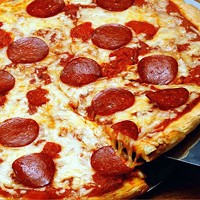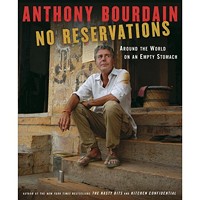When you think of improvisational art, you probably think about the freestyling of hip-hop artists, the chord-based extendo-boogie of jam bands, or, if you're really wanting to be my friend, the balls-to-the-wall (ovaries-to-the-wall if you're Alice Coltrane) shuffle and skronk of progressive and free jazz.
You probably don't think about the culinary arts -- which is a shame. Of course, recipes are part and parcel of cooking, and are roughly equivalent to notation and key in music -- that is to say, indispensable. However, following a recipe note for note, can, on occasion, leave the end result feeling (and tasting) a little flat.
Let's continue this analogy, shall we? To your average home cook, the thrill at "covering" a great recipe is often overcome by a certain melancholy that, in essence, all that has been accomplished is a mere cover version of the established dish. What that home cook might not realize is that, for any cook (chef, what have you), the real magic, as with music, often occurs outside of the cookbook, which, after a while, can begin to function much like a fakebook -- a simplified how-to guide for beginners consisting of simplified tablature or notes -- does to a musician. Sure, the cake is complete, but where's the icing? Where's the personal touch? Where's the magic?
To her credit, author Sally Schneider, in her wonderful (if sparsely illustrated) new book The Improvisational Cook, doesn't suggest cutting corners and throwing the cupboard into a given dish just for the sake of experimentation. Her advice is much like what any music (art, writing, etc.) teacher worth his or her sea salt would suggest: learn the tools of the trade and the compositional basics, get them down, and then begin tearing the whole thing apart and starting over if it so moves you. A culinary composer can have the greatest of intentions, but too much tomfoolery and too little taste can render his tapas a train wreck.
Schneider's book, the highly-anticipated follow-up to 2001's enthusiastically received A New Way to Cook, encourages cooks to not merely copy a recipe, but understand how and why it works. Armed with this knowledge, you may then begin to substitute ingredients, learn to think (as well as buy) organically, and cease being controlled by the words on the page in lieu of what's stewing in the pot, which, Schneider suggests, will always teach you more than pretty gastroporn pictures and Xeroxed index cards can any day.
The book is primarily aimed at the home cook, and as such most of the ingredients listed are available in the average mid- to upper-level grocery store. Schneider even teaches folks to cook with the basest utensils possible, explaining that too often folks will use the perceived lack of the latest kitchen gadget as an excuse to order in instead. She even suggests learning about the origins of the food you're eating and listening to what these origins tell us by way of allowing the food to speak of its possibilities to you (one big one being "foods that grow together go together") rather than the other way around.
Which, admittedly, might sound like a lot of mumbo-jumbo in this day and age that sees the Food Network's Tyler Florence hawking "signature dishes" at Applebee's (Whoooo! Chicken with Olive Oil and Rosemary!), but ignore Schneider's sage (both figuratively and literally) advice at your own risk.
Of course, as Schneider herself says, to write a book about improvisation is somewhat a contradiction in terms. Improvisation is spontaneous, utterly in and of the moment. Her stated goal is to simply get people to listen to themselves.
As anyone who's ever heard John Coltrane's Giant Steps can tell you, listening to yourself, your true self, is the beginning of all great art. As Schneider points out, it can also be the beginning of a great dinner.
Timothy C. Davis is an associate editor with Gravy, the official newsletter of the Southern Foodways Alliance. His food writing has appeared in Gastronomica, Saveur, the Christian Science Monitor, and the food Web site www.egullet.com. He may be contacted at timothycdavis1@gmail.com.
Speaking of 4.00000
-
Letters to the Editor
Dec 19, 2007 -
Checking it Twice
Dec 19, 2007 -
Racial Whiplash
Dec 19, 2007 - More »
Latest in Table Dancing
More by Timothy C. Davis
-

Smoke This Issue: Eats
Apr 18, 2012 -
Joe Firstman tonight (Nov. 10) at The Evening Muse
Nov 10, 2010 -
Hot Rize tonight (Nov. 5) at McGlohon Theatre
Nov 5, 2010 - More »
Calendar
-

Aria Tuscan Grill Featuring Allegrini - Charlotte Wine + Food Week @ Aria Tuscan Grill
-

Angeline’s Featuring Sciandri Family Vineyards @ Angeline's
-

Charlotte Wine + Food Week Presented by Truist @ Charlotte, NC
-

Cakeable Cafe Grand Opening @ Cakeable Cafe
-

Haw River Wine Tasting @ Carolina Beer Temple.
-
Dorie Greenspan's Tiramisu Cake
This layered cake is definitely a "pick-me-up" with a little booze and caffeine.
-
Authentic New York-style Bagels Come to South End 1
Poppy's expands its empire
-
Eating With Your Dollars: The best fast food money can buy 14
The Food Babe talks juicing.









